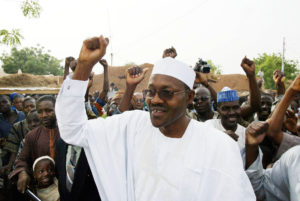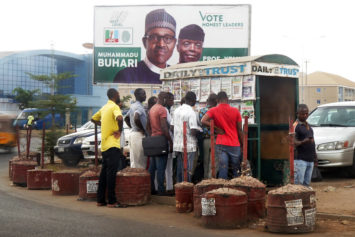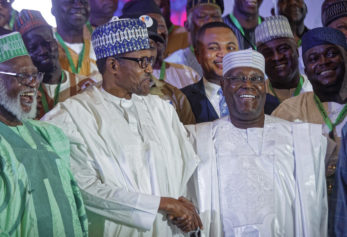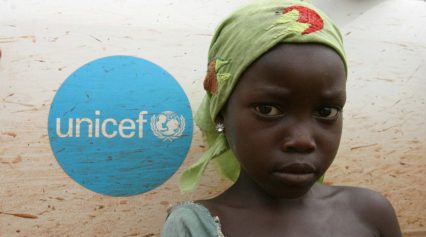
A plethora of issues needed immediate attention and many of the most grueling challenges would take years to truly overcome. But perhaps there was hope in the fact that Nigeria’s soon-to-be president said he was more committed to ending corruption and putting a stop to terrorism than many Nigerian leaders of the past.
Rather than deliver a speech of optimistic, empty promises, Buhari singled out the two items at the top of his agenda—defeating Boko Haram and solving widespread corruption.
Nigeria’s terrorism problem is rooted in its long-standing issue with high-level corruption, but now these issues have started attacking Nigeria on two separate fronts. As the militant group continues to be a major threat to peace throughout the country, corruption has caused Nigeria’s economy to buckle.
When analyzing a long list of issues that need to be addressed by the country’s leader, these are the two Buhari has, rightfully so, decided to highlight as he waits for the Independent National Electoral Commission (INEC) to formally declare him as the election’s winner.
Unlike many others who have addressed Boko Haram, however, Buhari seemed rather dismissive of the group and expressed his confidence in the “collective” strength of the nation along with its foreign allies.
“Boko Haram will soon know the strength of our collective will,” Buhari said on Wednesday. “We shall spare no effort until we defeat terrorism.”
Those sentiments mirror what Buhari expressed in January while on the campaign trail.
Despite Boko Haram’s massive kidnappings and rampant attacks that have left devastation in its wake, Buhari said dealing with the militant group “should have been an easy one.”
Perhaps it could have been if corruption from within was not also weakening Nigeria’s own forces.
Buhari shared a clear disdain for how little help the nation has received from foreign forces. But aid from outside the country’s borders will be essential in making headway in the battle against Boko Haram.
These combined efforts have already worked to significantly cut down on Boko Haram’s footprint within the country, but it isn’t clear just how much progress has truly been made. The Nigerian military recently made claims that almost all of the “local government areas” have been reclaimed from Boko Haram; but these claims have not been confirmed.
What is certain is that the military finally manage to push Boko Haram out of Gwoza, which had been a stronghold for the militant group for months.
For now, the public can only hope that the coming months will support Buhari’s perception of Boko Haram as an issue that could have been dealt with a long time ago rather than a genuine military threat—a perception shared by many of the diplomats who were present during Buhari’s speech in Nigeria’s capital.
“What they have is such an institutional problem, it’s going to take a long time to fix it,” one diplomat in Abuja told The New York Times.
While military efforts and hiring mercenaries have helped reduce Boko Haram’s presence in certain areas, it is merely a “short- to mid-term solution” for the greater problem at hand, the diplomat explained.
That’s because corruption is still at the heart of Nigeria’s problem.
The same soldiers who are being trusted to fend off the militant group have their own hands sullied by human rights abuses against the nation’s own citizens. Soldiers have killed and detained residents, only adding to the terror that citizens have already been subjected to by the hands of Boko Haram.
This, among other reasons, is why Buhari says terrorism cannot be solved without first addressing the “evils of corruption” that are plaguing Africa’s largest economic power. These evils not only laid the foundation for a group like Boko Haram to form, but the also caused economic stagnation.
The country’s ongoing struggle with “waste and corruption” discourage major foreign businesses from laying any roots in Nigeria while domestic leaders continue spending money on personal desires rather than trying to contribute to national progress.
Buhari promises to cut back on that waste and no longer tolerate anybody using government funds to fulfill selfish desires.
“In the face of dwindling revenues, a good place to start the repositioning of Nigeria’s economy is to swiftly tackle two ills that have ballooned under the present administration: waste and corruption,” Buhari added on Wednesday.
Experts couldn’t have agreed more with those sentiments.
“If you cut the graft, you can do things,” Pat Utomi, a leading Lagos economist, told The Times. “We have a new presidential jet in this budget. Most airlines in Nigeria don’t have as many jets as the presidential fleet.”
While following through on his promises to place a higher value on “accountability, integrity and transparency,” the emergency economy rescue plan will also need to address the lack of diversity in the country’s revenue stream.
When global oil prices plummeted, Nigeria was too reliant on the industry, which accounts for roughly 80 percent of government earnings.
What should have been one blow to a specific sector of earnings caused widespread financial turmoil within Nigeria’s borders. It’s an occurrence that could have been easily avoided had the nation not turned its back on an industry that previously garnered a significant amount of revenue for Nigeria—agriculture.
“We have cocoa, kolanut and several other cash crops,” a communications expert told Ventures Africa. “We cannot continue to rely on crude oil.”
The growth of the services sector would also present a major opportunity for the country, which now boasts one of the fastest-growing telecommunications markets across the globe.
All that and still, Buhari’s admission that decreasing the presence of Boko Haram and solving deeply rooted corruption within the government is only a “starting point” in repositioning Nigeria as a global power is an eye-opening reminder of just how much work has to be done.


